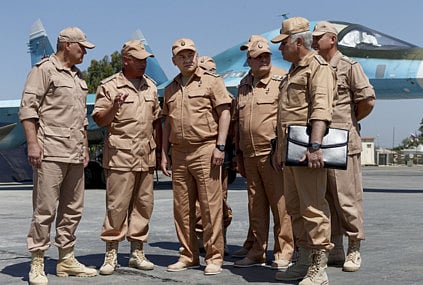Beirut: Among the presidents, prime ministers, kings and princes who have visited Moscow over the past year to meet with Russian President Vladimir Putin are some of the United States’ closest allies, who once might have been expected to devote their travel time to Washington.
There’s a new power rising in the Middle East, and it needs to be wooed.
Three decades after the Soviet Union collapsed and the United States emerged as the undisputed superpower in the Middle East and North Africa, a resurgent Russia is back.
Why has Russia become so important now?
Under the personal direction of Putin, Russia is stepping into the vacuum left by the disengagement of the Obama administration and the unpredictability of the Trump one to challenge the United States’ dominant role in the region.
Russian oilmen, arms dealers and financiers have been fanning out across the region, striking billions of dollars’ worth of deals, reviving old relationships and forging new ones from Libya to the Arabian Gulf.
It also positioned Putin at the nexus of the Middle East’s overlapping conflicts, leveraging Russia’s influence far beyond Syria’s borders to include all the countries with a stake in the outcome of the war — foes such as Israel and Iran, Qatar and Saudi Arabia, Syria and Turkey.
As a result, he has frequently been on the phone with U.S. allies such as Turkey and Israel — nearly three dozen times with the leaders of those two countries just in the past year.
Russia wants to ‘hear all sides’
Apart from Syria, Russia has shown little inclination to wade into most of the region’s myriad conflicts, such as the Yemen war, the Arab-Israeli peace process and the dispute between Qatar and its neighbors. But Putin has welcomed anyone who wants to visit, making Moscow a must-stop destination for leaders with a problem to solve.
“Putin is effectively working as the psychoanalyst of the region,” said Malik Dahlan, a Saudi who is a professor of international law and public policy at Queen Mary University of London.
“The Russians are happy to hear all sides, and anyone who wants to speak, they’re happy to listen.”
Phone diplomacy
When not hosting visitors, Putin is often on the telephone, usually sorting out problems relating to Syria but, in the process, cultivating close relationships with some of the United States’ dearest friends.
Israel’s Prime Minister Benjamin Netanyahu, who called Trump a “true friend” of Israel, has spoken 11 times on the phone with Putin over the past year and only three times with Trump, according to a tally of the calls reported on Putin’s and Netanyahu’s websites.
Netanyahu has visited Moscow four times in the past year. He has visited Washington twice since Trump became president.
It’s unclear whether Putin and Netanyahu’s rapport will survive building tensions between Israel and Iran in Syria and also Lebanon, where the Iranian-backed Hezbollah militia has expanded its influence.
They have spoken only once since the downing of a Russian plane in Syria in September, which Moscow blamed on Israel. But phone calls between Putin and Netanyahu at the time played a part in tamping down the worst of the animosity, diplomats say.
Turkey drifts into Moscow’s orbit
Turkey, a longtime U.S. ally and NATO partner with a centuries-old history of rivalry with Russia, has been drifting deeper into Moscow’s orbit of influence as their cooperation in Syria expands and relations with the United States have become strained.
According to a count of their interactions, Turkey’s President Recep Tayyip Erdogan in the past year has spoken 20 times on the phone with Putin and seven times with Trump.
Erdogan’s decision to purchase Russia’s advanced S-400 missile system, which Moscow says will be delivered next year, offers one example of how their burgeoning relationship could challenge the cohesion of NATO.
Russia has also been warming up to Lebanon and Iraq, both U.S. allies and recipients of U.S. military aid. In Iraq, Moscow has completed arms deals with the government, invested in a strategically significant oil pipeline linking the Iraqi region of Kurdistan to Turkey and opened an intelligence-sharing center with the Iraqi military in Baghdad, signaling its return to a country lost as an ally after the United States toppled Saddam Hussein.
Lebanon opens up to Russia
Lebanon came under intense U.S. pressure earlier this year to rebuff a $1 billion arms deal offered by Russia that would have ended a decades-old U.S. and Western monopoly on supplying aid to the Lebanese army, according to a Lebanese government official who spoke on the condition of anonymity because he was not authorized to discuss the subject.
Late last month, however, Prime Minister Saad Hariri accepted a donation of “millions of Kalashnikov bullets” from Russia, which will be given to the internal security forces, his office said.
Sign up for the Daily Briefing
Get the latest news and updates straight to your inbox
Network Links
GN StoreDownload our app
© Al Nisr Publishing LLC 2026. All rights reserved.
